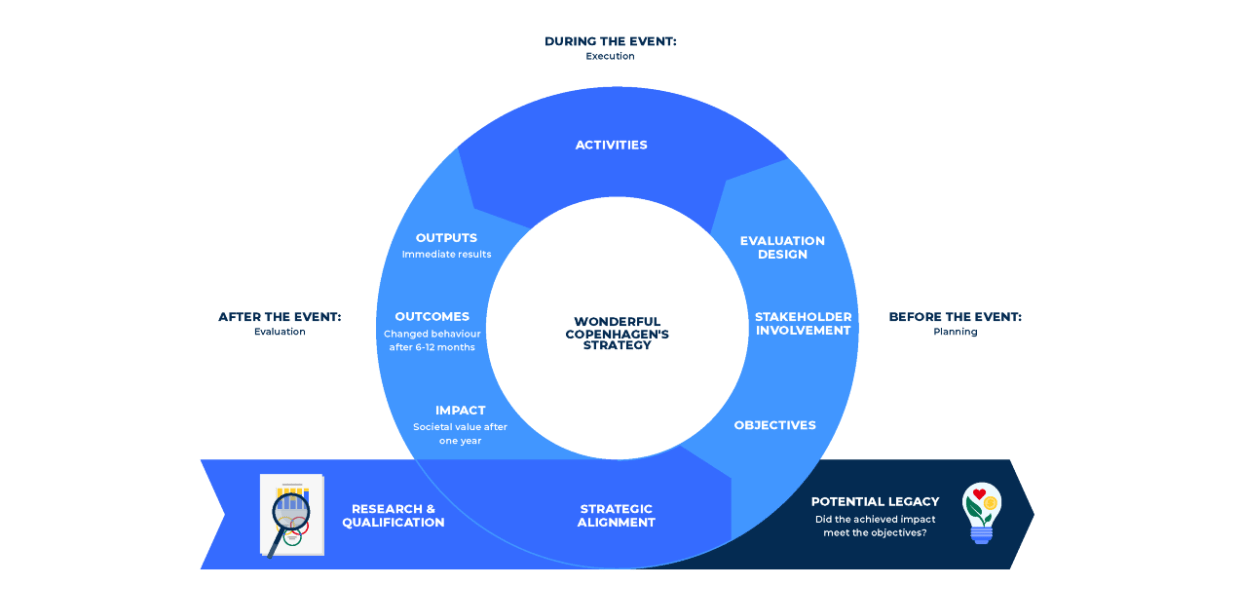Legacy Framework
A systematic approach to enhancing the value creation from congresses and events.
The 'Legacy Framework' is a dynamic model developed by Copenhagen Legacy Lab. It draws inspiration from the European Commission’s approach to ‘Social Impact Measurement’, the ‘Theory of Change’ methodology, and the PhD dissertation ‘The Impacts of Academic Events’. The purpose of the framework is to ensure a systematic approach to legacy. We call it legacy when the achieved impact from a congress or an event meets the objectives of the legacy project.
The framework is structured around Wonderful Copenhagen’s strategy and consists of three phases: before, during, and after the event. The model calls for close collaboration and co-creation between the international association and relevant stakeholders from the destination.

Photo:Copenhagen Legacy Lab
Before the event (planning)
Research & qualifications:
Copenhagen Legacy Lab collects relevant information to assess the legacy potential of each congress or event. The following key factors will be considered:
Congresses:
- Alignment with Copenhagen's prioritised strongholds: Life-Science, Green Transition, and Information & Communications Technology. While not exclusive, congresses within these sectors are prioritised.
- Identification of societal challenges linked to the industry or theme of congress (e.g., addressing a talent gap within a specific industry).
- A timeline of at least 18 months before the congress takes place in Copenhagen.
Major Events:
- Identification of unique opportunities (e.g., leveraging badminton’s strong position in Asia, see case).
- Potential for addressing societal challenges (e.g., educating senior citizens in IT security, see case).
Strategic alignment: Copenhagen Legacy Lab strives to find overlapping interests between the international association’s mission and vision and local priorities and challenges. Through discussions, the aim is to uncover mutual opportunities for collaboration. The end goal is to identify a “sweet spot” – a mutual foundation of the legacy project.
Objectives: Based on strategic alignment, Copenhagen Legacy Lab will formulate concrete objectives together with decision-makers from the international association and local key stakeholders. Throughout this phase, it is also clarified what resources are needed from both the association and locally.
Stakeholder involvement: This phase includes the identification and engagement of a broader range of relevant stakeholders that can support the legacy project (e.g., local universities, clusters, public-private collaborations, hospitals, NGOs). Through dialogue and facilitated workshops, concrete activities are developed to meet the objectives of the project. This phase can be supported by tools like inspiration cards and posters (see toolkit).
Evaluation design: To measure the impact of the decided legacy activities, an evaluation plan is outlined early on in the process. It is crucial to secure that the measured outcome aligns with the objectives, and this exercise often results in sharpened objectives and adjusted activities.
During the event (execution)
Activities: The legacy activity can take various formats, e.g., a patient education day, a talent-attraction workshop, or a public health screening programme. The activity typically takes place during or just before or after the congress/major event while the participants are in town.
After the event (evaluation)
Outputs (immediate results): Direct results are collected during or immediately after the legacy activity (e.g., startups establishing new and relevant contacts with potential investors).
Outcomes (after 6-12 months): Assessment of whether the outputs have led to a changed behavior or improved performance (e.g., the established contacts turn into a concrete investment).
Impact (after 1 year): Evaluation of broader societal effects (e.g., investments leading to job creation).
Potential legacy (after more than 1 year): An overall assessment will determine if the impact has met the strategic objective of the project and thus, created a legacy.